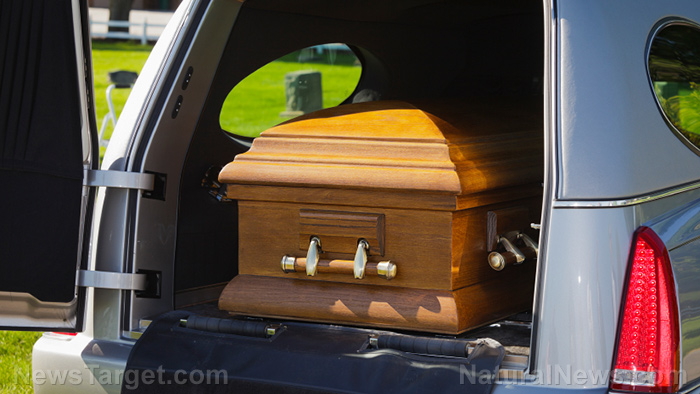Spain is performing DRIVE-THRU FUNERALS as the country and the rest of Europe continues to suffer from coronavirus
04/07/2020 / By Arsenio Toledo

The La Almudena cemetery in Madrid, Spain has been holding one drive-through funeral service every 15 minutes for people who died from COVID-19. Hearses drive up to the doors of the chapel where a priest stands by, waiting to perform a quick version of the Catholic funeral rites. No more than five relatives are allowed to attend each quick funeral service, with each person keeping their distance from one another. The priest says a blessing, and at the end of the ceremony, the driver opens the trunk to reveal the sealed casket and the priest douses it with holy water. The casket is then put on a gurney by workers in masks and gloves and taken away to be either buried or cremated. The whole ritual takes no more than five minutes.
There are no eulogies, no visitations and no public burials. As the hearse drives off, another comes in just moments later. To cater to extended family and friends, some of the funeral-goers have resorted to online-streaming the five-minute service. This is how funerals are being held under Spain’s State of Emergency, which has kept people in the country in their homes, with very few exceptions, for over three weeks now. All the country’s churches have been shut down, so this is one of the few instances where the Catholic population of Spain will meet a priest.
“You can see it in their faces, the great pain,” said Father Edduar, one of the Catholic priests at La Almudena.
“I try to be close to them. I tell them I’m with them and that they’re not alone. Sometimes it upsets me. I cry. It might sound a bit strange, but in this historic moment, I consider this a privilege… my life is for the people – to be with them in this crucial moment.”
CORONAVIRUS:
▶️A Madrid funeral attended by only two mourners, Friday becomes the new norm, as social distancing continues in Spain. Spain so far reported 65,719 COVID-19 cases, and 5,138 deaths.
👉Spain Enters Third Week of Coronavirus Lockdownhttps://t.co/H4LVXW7c66 pic.twitter.com/1NdLCW6SUO
— The Voice of America (@VOANews) March 27, 2020
Too early to tell if Spain is past the worst of its coronavirus outbreak
Spain currently has 130,759 confirmed COVID-19 cases, including 12,418 fatalities. The Madrid region alone accounts for nearly 5,000 of these deaths – by far the highest in the country, with the region of Catalonia coming in at a distant second at around 2,600 deaths.
On Monday, Spain recorded 637 COVID-19 fatalities – the fourth consecutive day that the country’s number of coronavirus-related deaths has fallen. It is also the country’s lowest daily death toll since March 24.
On Thursday last week, the number of deaths peaked at 950. While it may be too early to tell if the country’s current measures to combat the coronavirus are working, Prime Minister Pedro Sanchez tried to use this opportunity to lift the spirits of his people.
“We are starting to see the light at the end of the tunnel,” declared Sanchez after announcing that he would be extending the country’s lockdown until April 26, the second time it was extended since it originally came into force on March 14.
Sanchez further stated that some lockdown restrictions, such as keeping non-essential workers at home, could be lifted after Easter.
Meanwhile, according to Minister of Foreign Affairs Arancha Gonzalez, the government plans to use the lockdown extension to widen coronavirus testing to include people without symptoms.
“It is important to know who is contaminated to be able to gradually lift Spanish citizens lockdown,” said Gonzalez in a TV interview.
Salvador Illa, the country’s Minister for Health, was optimistic. He told reporters that Spain was reaching “the top of the curve,” and that the spread of the virus in the country may have already peaked. He added that once the country believes the pandemic in their country is under control, the government would begin considering when and how to scale back its lockdown measures.
Fate of Europe depends on whether they acted quickly and decisively
Many parts of Europe don’t seem to be fairing well. In Germany, the number of coronavirus cases rose above 100,000 on Monday, becoming the fourth country to do so, even though data suggests that restrictions on movement are having an effect on their number of fatalities.
Chancellor Angela Merkel said it’s critical for Germany that the number of cases continue to decrease before they make any decisions with regards to easing social distancing measures. As more and more older Germans are getting infected, their concerns are turning to whether or not they have enough ventilators to keep up with demand, especially since older patients require ventilation for longer periods of time.
Germany has even begun admitting coronavirus patients from other EU countries – 85 patients came from overburdened areas in France, 26 more from Italy and two from the Netherlands. Many were transported in planes flown by the German Air Force. The German government has even offered to assist Spain with its critical patients. However, as of press time, the Spanish government has yet to respond to the offer.
German hospitals have now admitted 113 #patients infected with the #coronavirus from #EU partner countries. The majority come from #France and #Italy. Find out more about #Germany's commitment to helping in times of #COVID19: https://t.co/7KA5pigNuD #NewsDE #Corona19Pandemic pic.twitter.com/62xwYk029V
— Deutschland.de/en (@en_germany) April 2, 2020
In France, the situation also appears to be bleak. According to the latest Johns Hopkins data, France has now surpassed China on the number of COVID-19 cases. On Monday, they reported a record toll of 833 new coronavirus-related deaths in a single day. According to Health Minister Olivier Veran, the country hasn’t even reached its peak number of deaths in a day, especially since the government is now also counting the deaths from nursing homes, where a significant number of elderly patients are succumbing to the disease.
In the UK, Prime Minister Boris Johnson was diagnosed with COVID-19 on March 27. On Sunday, due to “persistent symptoms,” he was admitted to a hospital in London for further treatment and testing. Just a day later, he was moved into an intensive care unit despite government reports stating that he was still in charge and was “in good spirits.”
Last night, on the advice of my doctor, I went into hospital for some routine tests as I’m still experiencing coronavirus symptoms. I’m in good spirits and keeping in touch with my team, as we work together to fight this virus and keep everyone safe.
— Boris Johnson #StayHomeSaveLives (@BorisJohnson) April 6, 2020
Johnson has been criticized for waiting too long before issuing lockdown orders. He was also reported saying during a press conference that the coronavirus didn’t stop him from shaking hands with everybody he met during a hospital visit.
On the other hand, Denmark and Austria are easing coronavirus lockdown restrictions, becoming the first European countries to do so.
Chancellor of Austria Sebastian Kurz announced that small retailers, hardware stores and even gardening shops will be opened after Easter Sunday, April 12. If the virus truly has been contained in the country, more shops could be reopened in May and schools and universities could hold physical classes again in mid-May.
Denmark has followed suit, with Prime Minister Mette Frederiksen announcing a “cautious reopening,” starting with kindergartens and primary schools on April 15 if the country’s current coronavirus cases remain stable. The Danish government is also starting talks with the country’s business leaders on the possibility of gradually moving employees out of their work-from-home arrangements and back into their offices.
Kurz and Frederiksen echoed the same sentiments when they announced the easing of restrictions on their respective countries’ freedoms of movement: They are able to do this because they took the coronavirus pandemic seriously and responded quickly and decisively.
“We have reacted faster and more restrictive than other countries,” said Kurz in a statement. “We’ll also get out of the crisis faster if everybody continues to stick to the measures.”
“We’ve managed to avoid the misfortune that has befallen a number of other countries,” said Frederiksen. “The only reason for that is that we acted early.”
Sources include:
WHO.int [PDF]
Tagged Under: Angela Merkel, Austria, Boris Johnson, China, coronavirus, covid-19, deaths, Denmark, drive-thru funeral, economy, Flu, funeral, funerals, Germany, government, infections, lockdown, Madrid, Mette Frederiksen, outbreak, pandemic, Pedro Sanchez, quarantine, Sebastian Kurz, social distancing, Spain, superbugs, United Kingdom, virus



















